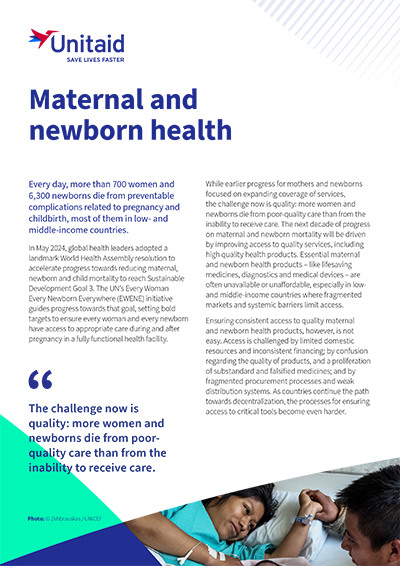Every day, more than 700 women and 6,300 newborns lose their lives, largely due to preventable complications in pregnancy and childbirth. New data on maternal mortality, published by the World Health Organization on World Health Day (7 April), draws attention to the stalling progress in maternal health.
The report shows that, although maternal deaths have fallen by 40% between 2000 and 2023, the rate of decline has begun to plateau.
“Earlier progress focused on expanding coverage of services for mothers and newborns. Now, the critical challenge is ensuring those services are high quality,” said Dr. Jeffrey Smith, Senior Technical Manager for Maternal and Newborn Health at Unitaid. “The next decade of progress will depend on improving how care is delivered – especially by ensuring that lifesaving medicines, diagnostics, and devices are consistently available and of reliable quality in low- and middle-income countries, where 90% of maternal and newborn deaths occur.”
Quality care means trained health workers, in functioning facilities, equipped with high-quality products, available to all mothers and newborns. Unitaid is committed to working with governments, communities and other country partners to co-create meaningful projects that complement and reinforce existing services. We are emphasizing sustainable financing and pathways to scale to unlock timely access to vital tools, when and where they are needed – saving lives and protecting the health of mothers and newborns.
We are developing a portfolio of maternal and newborn health investments aimed at increasing access to products to diagnose, monitor and treat specific pregnancy related conditions, and supporting the systems that enable women and newborns to receive quality care. This includes efforts to address postpartum hemorrhage, preeclampsia and anemia, and eliminate vertical transmission of infectious diseases.
This World Health Day begins a year-long campaign led by WHO to urge governments and the health community to ramp up efforts to end preventable maternal and newborn deaths, and to prioritize women’s longer-term health and well-being.
Essential maternal and newborn health products are often unavailable or unaffordable in low- and middle-income countries, where fragmented markets and systemic barriers limit access. Learn more about what Unitaid is doing to confront these challenges.

Maternal & newborn health issue brief
Download
Kyle Wilkinson
Communications Officer, Unitaid
+41 79 445 17 45
wilkinsonk@unitaid.who.int